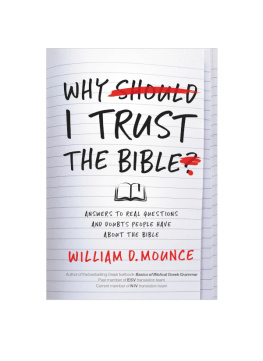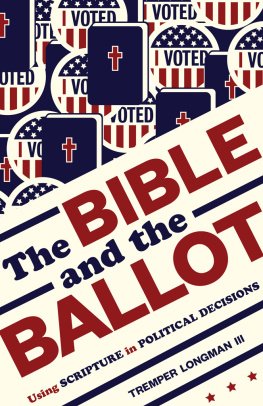WHAT ARE BIBLICAL VALUES?

Copyright 2019 by Yale University.
All rights reserved.
This book may not be reproduced, in whole or in part, including illustrations, in any form (beyond that copying permitted by Sections 107 and 108 of the U.S. Copyright Law and except by reviewers for the public press), without written permission from the publishers.
Yale University Press books may be purchased in quantity for educational, business, or promotional use. For information, please e-mail (U.K. office).
Set in Janson type by IDS Infotech Ltd., Chandigarh, India.
Printed in the United States of America.
Library of Congress Control Number: 2018968057.
ISBN 978-0-300-23193-9 (hardcover : alk. paper)
A catalogue record for this book is available from the British Library.
This paper meets the requirements of ANSI/NISO Z39.48-1992 (Permanence of Paper).
10 9 8 7 6 5 4 3 2 1
To the students of Yale Divinity School who took the course
What Are Biblical Values? in the years 201218
Contents
Acknowledgments
Key chapters of this book were delivered as the Sprunt Lectures at Union Theological Seminary in Richmond, Virginia, in May 2018. My thanks are due to Brian Blount, president of Union Seminary, and Professor Sam Adams for the invitation to deliver those lectures. Thanks are also due to the Reverend Jeff Braun, Professor Rebecca Raphael, and Professor Robyn Whitaker for invitations to lecture on biblical values on other occasions, to Fred Appel of Princeton University Press for feedback on the manuscript, to T. J. Thames for assistance when he was my teaching assistant, and to Jennifer Banks, Heather Gold, and Mary Pasti for guiding the book to publication at Yale University Press.
What Are Biblical Values?
T ALK of biblical values is ubiquitous in American political discourse. An advertisement in the Wall Street Journal by the Billy Graham Evangelistic Association, published in the run-up to the presidential election in 2012, provides a typical example. In it the popular preacher calls on his readers to vote for candidates who affirm biblical principles and support the nation of Israel. He continues: I urge you to vote for those who protect the sanctity of life and support the biblical definition of marriage between a man and a woman.
Values are principles that offer guidance for human conduct, rather than specific laws or commandments. So, for example, we might think of love of God and ones neighbor or the pursuit of holiness as broad values that might be espoused in a variety of ways. In practice, however, biblical values are often boiled down, as they are in the Wall Street Journal advertisement, to specific positions on a few hot-button issues, most frequently the rejection of homosexuality and abortion and the affirmation of traditional family values. These positions stand as symbols for a way of life. They are seldom accompanied by any serious reflection on what the Bible actually says about them. Rather, people who accord high symbolic value to the Bible tend to assume that it conforms to their own traditional views. If they read the Bible with any care, they might be surprised by what they find.
My purpose in this book is to examine what the Bible actually says, what values the Bible actually affirms, on several key issues. My interest is in the relevance of the ancient texts to modern situations.
Before we turn to specific issues, however, there are some preliminary problems that must be addressed. To speak of what the Bible actually says is at best a deceptively simple task, at worst a hopelessly nave one. The task is complicated especially by three questions.
First, the Bible is a written text, not a speaking agent. As such, does it say anything at all? It is conventional, of course, to say that the Bible, or a specific book, says this or that, but this is only convenient shorthand. To extract meaning from the written text, we must subject it to a process of interpretation, in which our own presuppositions inevitably play a role. We are constantly reminded that texts can be manipulated to reflect the agenda of the interpreter. Is it still possible to ascribe any kind of objective meaning to the Bible?
Second, the Bible is a collection of texts, written over the course of more than a thousand years. It is neither systematic nor consistent, and it often espouses contradictory positions. Is it possible to generalize about biblical values in a way that has overarching validity?
Third, if we can speak of biblical values, as I believe we can, must we always affirm them? The Bible has traditionally provided support for many positions that we may now regard as reprehensible: slavery, genocide, subordination of women, legitimization of violence, and intolerance of diversity. Any discussion of biblical values must consider not only what these values are but also whether anyone in the modern world has any obligation to conform to them.
DOES THE BIBLE ACTUALLY SAY ANYTHING ?
Perhaps the fundamental challenge to any attempt to speak of biblical values concerns the possibility of objective interpretation. We might make a similar argument about the use of the US Constitution in legal decision making. There, too, the supposedly authoritative text can be manipulated to support positions that the interpreter wishes to affirm for reasons quite independent of the Constitution itself. The way we interpret any text depends on the presuppositions and agendas we bring to it.
The claim that texts such as the Bible do not speak independently of interpreters is true in the literal sense. Texts in themselves do not convey meaning without the agency of authors and readers. What the Bible really says is a way of saying what I take the Bible to really mean. This does not mean that interpreters can make texts mean anything they wish. Readers are constrained by the communities in which they live. Jewish and Christian believers have always filtered the Scripture through their respective traditions. For many Christians, it seems obvious that Old Testament prophecies such as Isaiah 7:14 (the virgin shall conceive and bear a son) and Isaiah 53 (the Suffering Servant) are prophecies of Jesus, even though they were written many centuries before his birth. For Jews looking at the Hebrew Bible (the same text as the Old Testament), such interpretations are not credible at all. The argument that interpretation is, and should be, determined by the tradition in which we stand and the interpretive community to which we belong has obvious appeal to people who are committed to a given tradition, since it exempts the community from assessing it with external criteria.
But the constraints on interpretation do not come only from communal tradition and social consensus. There are also constraints of language and grammar. The biblical texts were written long ago in languages that are no longer spoken in their ancient form. A reader who wishes to read the Bible competently needs to master those languages and their ancient contexts or rely on others who have that mastery. In effect, the reader needs to know not only his or her own interpretive tradition but the linguistic world in which the text was produced. But the validity of any new interpretation must still be assessed by its ability to account for the words on the page in a way that does not do violence to their grammar and their ancient context.
In short, interpretation does not yield meanings that are objective in the sense of being timelessly valid, but they are not simply indeterminate either. In the words of the literary critic A text, biblical or not, may have more than one meaning, but we can at least set limits to the range of acceptable interpretations.
Next page














